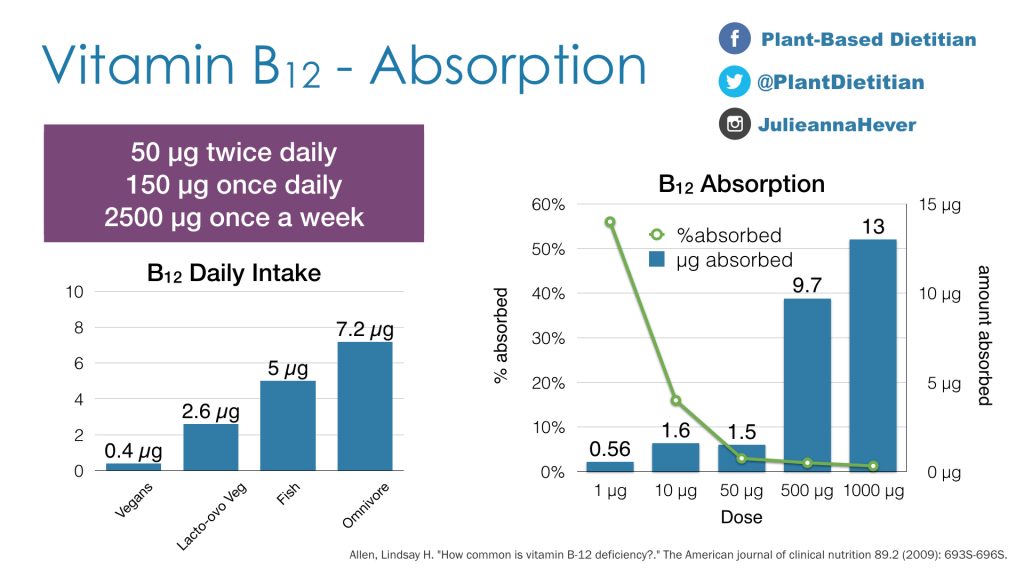Vitamin B12 Recommendations on a Plant-Based Diet
A plant-based diet has been shown time and time again to be the most health-promoting, disease-fighting, and nutrient-dense way of eating possible. Emphasizing a wide range of vegetables (especially leafy green varieties), fruits, whole grains, legumes, nuts, seeds, herbs, and spices makes it simple to achieve nutrient needs while avoiding chronic overnutrition.
Guides such as the Plant-Based Food Guide Pyramid and Plate, 6 Daily 3’s, and Notable Nutrient Chart help with the high level view of what exactly a day-in-the-plant-based-life may look like.
One nutrient that likely will fall short on a plant-based diet is cobalamin, commonly referred to as vitamin B12. B12 is produced by microorganisms, bacteria, fungi, and algae, but not by animals or plants. B12 is found in animal products because they concentrate the nutrient after ingesting these microorganisms along with their food in their flesh, organs, and byproducts (e.g. eggs and dairy). Also, ruminant animals (such as cows, sheep, and goats) have bacteria in their rumen that produce vitamin B12.
In a vegan diet, vitamin B12 may be found in fortified plant milks, cereals, and other foods, such as nutritional yeast. However, if vegans are not conscientious about taking in the recommended dietary allowance (RDA), there could be harmful health consequences. Deficiency can result in potentially irreversible neurological disorders, gastrointestinal problems, and megaloblastic anemia. Though B12 is certainly the most common of vegan supplements, B12 deficiency is not unique to vegans who do not supplement. Deficiency is also a concern with aging, medication use, and gastrointestinal issues. So much so that it has been recommended that all adults over the age of 60 years supplement to avoid deficiency.
Interestingly, the body is able to store B12 for upwards of even ten years. To further complicate this, signs and symptoms for deficiency are either not noticeable or simply very subtle. So, if B12 is not being taken in at adequate levels or if there are absorption problems, deficiency will eventually ensue. Because blood tests for B12 levels can be skewed by other variables, irreversible damage may occur before a deficiency is detected.
RDA’s for vitamin B12 across the lifespan can be found in detail here. For non-pregnant adults, aged 14 and above, the RDA is 2.4 micrograms per day. To ensure this is absorbed (in a healthy individual, barring any possible inhibitors), higher doses are recommended.

The bottom line is that it seems the best way to supplement to maximize absorption and maintain optimal blood levels of B12 is for vegan adults (as well as non-vegan adults over the age of 50) should consider supplementing with these doses of vitamin B12:
- 50 µg twice a day OR
- 150 µg once a day OR
- 2,500 µg once a week
High doses of B12 are safe and there isn’t a tolerable upper limit that has been established. It is best to undergo testing regularly and adjust the dose as necessary.




This Post Has 9 Comments
How about those on a WFPB diet with the MTHFR mutation? I read that only methylcobalmin is ok for them.
thank you
My understanding is that it depends on the type of gene mutation you have. This is something best discussed with your physician.
What about the lung cancer concerns for men?
Great question. Looks like this study “found that consuming high-dose individual B6 and B12 vitamin supplements over a 10-year period is associated with increased lung cancer risk, especially in male smokers.” http://ascopubs.org/doi/10.1200/JCO.2017.72.7735
“At this time, there doesn’t seem to be enough evidence to warrant separate vitamin B12 recommendations for smokers.” This comes from this article: http://www.veganhealth.org/b12/smoke
Thanks for sharing this key info, Julieanna! I occasionally come across disturbing discussions in some vegan forums suggesting trying to get B12 from questionable sources and worry about people being misled. On the other side of the spectrum, there seem to be too many non-vegans using B12 as “proof” a plant-based diet isn’t natural.
We all need to remember that vegans are normal people, too, and our diets aren’t always optimal. And, as you pointed out, there are other confounding factors that can lead to nutrient deficiency. I agree that regular testing and a focus on nutrient density is the way to go!
Exactly! Thank you for your comments, Theresa! And there is no such thing as a perfect diet anyway. A plant-based diet seems to be ideal with respect to disease risk reduction, but, yes, we need to supplement with B12. I think it is worth all of the myriad advantages. Yes, ha, vegans are normal people, too. And this should be the least controversial issue when it comes to eating a vegan diet. Supplementing is the simplest, most effective, cheapest, and safest way to avoid deficiency.
Hi Julieanna,
I started taking some B12 three weeks ago but I bought one brand that contains Xylitol and because of it, I been having lots of migraines. Are there any brands of B12 out there without Xylitol that you would recommend ?
Yes, there are a bunch. Here are just the first couple of formulas I found on an Amazon search: http://amzn.to/2H8z0ZV and http://amzn.to/2EwtqlE